I was recently invited to take part in a really fun panel for booksellers, where sales and distribution professionals got to ask a bunch of Orbit authors questions about their new books. I was one of three panellists, alongside the super-talented Holly Race and AM Kvita. Afterwards, it struck me that many of the topics we discussed and the questions we answered would be of interest to pretty much all readers, not just booksellers, and so I figured I’d pull together some of them here.
Obviously these are just my answers pertaining to The Last Vigilant – I can’t speak for Holly and Kvita!
1. What was the elevator pitch for your book?
The one-liner that I first wrote down was “Miss Marple and Richard Sharpe solve mysteries in Westeros.” It’s obviously glib, but it instantly sets the scene, and in terms of vibe it’s not far off the mark.
It’s really a detective story in an epic fantasy world, following an unlikely team of Enelda Drake, the last remaining Vigilant, and Holt Hawley, a big lump of a soldier, as they try to solve a kidnapping case that might bring two nations to war. All the elements are introduced for the exploration of a wider epic fantasy world.
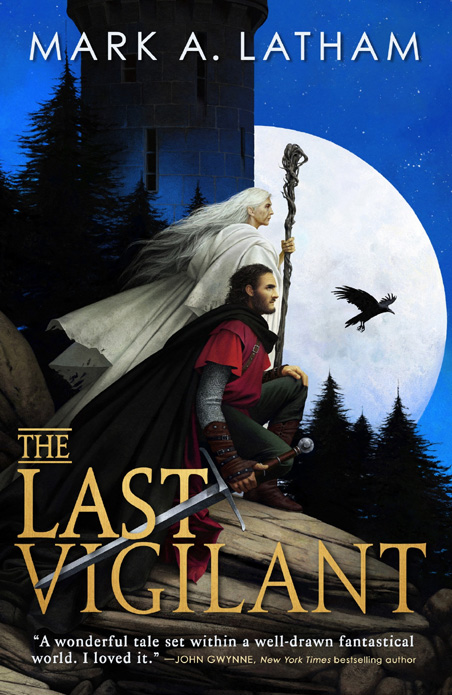
2. What was the first inspiration or germ of an idea that ultimately led to the book?
I’d just finished my contribution to Gaslight Gothic, an anthology blending Sherlock Holmes with the uncanny. This sparked the idea of a “fantasy Sherlock Holmes”, and it all stemmed from there. The first thing any detective story needs is a compelling detective, and so the character of Enelda Drake was really the very first element of the book I decided on, and never changed. My initial notes were something like this:
- I decided that Enelda would be more Marple than Holmes – a little old lady with a brilliant mind, who can switch from disarmingly sweet to fiercely powerful in an instant. She’s part of ancient order of demon-hunters, whose superpower is their power of observation and deduction. They have to see literally every small detail, and fill their heads with minutiae. If they stop concentrating for even a moment, they leave space for the demons to get in. She can concentrate so hard that she sees the space between worlds, and can explore a realm called the Eternal Night, halfway between reality and the spirit world.
- She’s the last of her kind. She’s been living alone in a tumbledown tower in a haunted forest for over 40 years – it’s safer for everyone if she’s nowhere near people, because people are weak and fallible. It’s driven her a little bit mad, but underestimate her at your peril.
- Because she’s been removed from society for so long, she has a habit of “telling it like it is”, with pretty much no filter. She no longer has an entire order to back her up, so I devised a down-on-his-luck soldier called Holt Hawley. He’s the man who finds her and brings her back to civilisation, but his main job in the early parts of the book is take beatings on Enelda’s behalf.
3. How did you decide on the setting for your story?
The desire to tell a detective story informed the setting. Aelderland is analogous to medieval England. It’s a pseudo-medieval setting for a reason – by making a world that’s familiar to a lot of readers, it grounds all of Enelda’s deductions and observations in reality. Readers understand this world because they’ve all seen movies or read books set in medieval Europe. I can skim over a lot of day-to-day aspects of the world, and focus on the things that make it different from our world, like the gods, magic and myth.
It means most of Enelda’s deductions are logical, and I can reserve her more uncanny abilities for the big impactful moments. If the world was more fantastical, the traditional mystery story just wouldn’t work, because there could always be a magical explanation for everything, and readers would never be able to work out how it was done.
4. Is there magic in your book, and if so how does it work?
The Last Vigilant is “low fantasy”. Again, this is part of that desire to ground things in reality. However, there are magical elements that are key to the plot, and a few that I’ll explore more in later books.
There used to be actual magic in Aelderland, and there still is magic in other kingdoms. All magic is derived from a coal-like element called blackrock, which forms naturally under the ground. Magic in this world is a form of alchemy, with various powders, potions and even objects made from blackrock, but its use is very dangerous. Where blackrock is concentrated, reality warps and monsters dwell. Blackrock is outlawed in Aelderland, although they do still mine it in secret, and export it to other kingdoms. They use the rationale for this hypocrisy that only foreigners would be mad enough to use the stuff…
The Eternal Night. This is Enelda’s secret weapon. She uses psychometry as a focus for this ability – using an item from the scene of a crime she can enter the Eternal Night, and view past events associated with that item as if she was really there. Unfortunately, demons from beyond the veil can enter the Eternal Night, and Enelda’s presence there draws them like moths to a flame, so she has to be in and out quickly. It takes a heavy toll on her, especially because she’s no spring chicken any more, and she’s been out of action for so long.
Finally, there are entities in this world that are basically angels and demons. The angels are called Majestics, the servants of the gods, and the demons are the Riftborn. Both of them like to possess weak-willed mortals, for different reasons, and they’ve been fighting each other for millennia. The Vigilant Order was originally formed to fight the Riftborn, and persuade the Majestics to leave the mortal realm – unfortunately, most of them are very reluctant to go without causing a fuss.
5. How did the experience of writing epic fantasy differ from your previous work?
I think my previous books gave me the tools to overcome a lot of the challenges with this book. A sort of genre mash-up? Check! A complex whodunnit? Check! Supernatural elements? Check!
The biggest challenge for me was the sheer scope and length of the book. More characters, more worldbuilding, more pages… I’m not the world’s fastest writer, and I’ve never before had an editor tell me to make a book longer. “That’s interesting, why not expand on that?” or, “That side-character seems like they could have more to do.” I think I added around 20k extra words in the edits, and that means that book two needs to be a similar size. I’ve made a rod for my own back 😊
If you’re interested in learning more about The Last Vigilant, I recently took part in a Reddit AMA, and you can access it here.


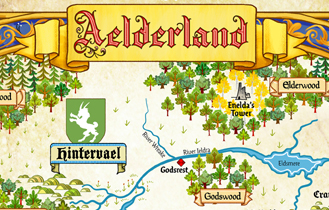
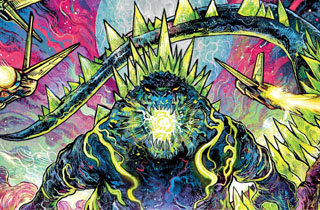



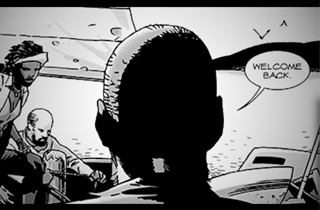

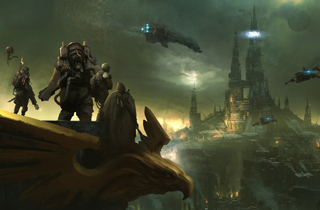
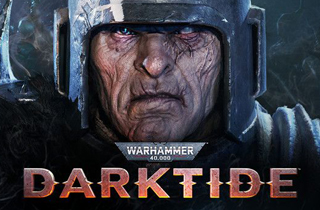
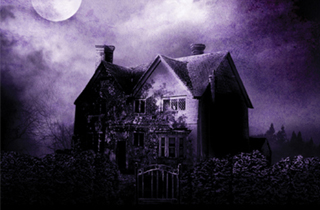
The “mash-up” of fantasy and detective novel worked brilliantly for me, and your world was well-drawn and easy to visualise without patronising the reader. I loved it, thanks Mark! I’m champing at the bit for the next book now, so you can give me updates if you see me in your favourite café (and I did notice the little local reference in your map)! Don’t worry, I won’t do a Misery on you!! 😁